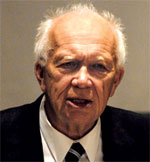CAMPUS
BUZZ
Buzz Words
What campus visitors are saying
more: Rod Paige | Sergei Khrushchev

Bradley mixes politics, basketball
New York Times best-selling author and former U.S. Sen. Bill Bradley spoke at UT Arlington last fall on the United States' problems and his proposed remedies, and when he was through, he invited questions. The first was on basketball.
Before entering politics, Bradley was a three-time All-American at Princeton University and a 1964 Olympic gold medalist. After college, he played professionally for 10 years with the New York Knicks and was elected to the Basketball Hall of Fame in 1982.
The questioner asked Bradley, who represented New Jersey in the Senate from 1979-97, what he had learned from basketball that helped him in his personal and political life.
"My high school coach taught our team the value of winning and losing graciously," Bradley said, recalling his coach's frequent admonition: "When you lose, don't cry. And when you win, don't crow."
Bradley, a Rhodes Scholar and 2000 candidate for the Democratic presidential nomination, revised that advice: "When you lose, cry, and when you win, crow. But when you are crying, know you will soon be crowing, and when you are crowing, always remember that you will cry again."
Young people who never experience the pain of losing are ill-prepared for life, he said. "When a job loss comes, a close friendship ends or their marriage breaks up, they do not have the experience to cope with it."
Although his talk examined the ills of America, Bradley remains upbeat. He said he believes in the American people and their ability to make changes, and that solutions lie in an "ethic of connectedness," the blending of collective action and individual responsibility.
Bradley hosts American Voices, a weekly show on Sirius satellite radio that highlights the accomplishments of Americans, both famous and unknown. His latest book, The New American Story, explores the changes he says the United States needs in its politics and in citizen activism to ensure a bright future.
- Sue Stevens

Paige stresses global education standards
Former U.S. Secretary of Education Rod Paige calls Texas a leader in education, but he urges broader accountability and faster improvements throughout the country so students can become more competitive worldwide.
"Let's set standards that compete with graduates in Singapore," he said on campus in October. "That means a third-grade child will do third-grade-level math."
Dr. Paige said educational improvements are too slow. He especially supports closing achievement gaps between blacks and whites. Math score gaps were at 29 in 2007, down from 38 in 1990, indicating progress.
Yet the retired statesman isn't satisfied. "At this pace, it will take 55 years to close the gap. How many students will be impacted?"
Paige said education is a civil right and that future generations will be shaped by the quality of education available to all races. Everyone should be held accountable for education, he said, not just the government-and finger-pointing should stop, because children don't benefit from it.
He used a quote from H.G. Wells to highlight his concern: "History is a race between education and catastrophe."
Paige, 74, was born in Mississippi and earned a bachelor's degree from Jackson State University. He earned master's and doctoral degrees from Indiana University.
The Senate confirmed him as the seventh education secretary in January 2001. Serving under President George W. Bush until 2005, he was the first school superintendent and first African American to fill that role.
- Jenny Blankenship

Khrushchev recalls space race
Sergei Khrushchev was a 22-year-old engineering graduate student when Sputnik's launch touched off the space race.
The son of former Soviet Premier Nikita Khrushchev spoke on campus last fall in observance of the 50th anniversary of Sputnik I, the world's first artificial space satellite.
Instead of celebrating at the Kremlin, he and his father were at Mariinsky Palace in the Ukraine. The premier was in what seemed to Sergei like an endless meeting with local officials. About midnight, his father left the room to take a phone call.
"My father came back in and told everyone that our engineers had just put the first artificial satellite in orbit," Khrushchev recalled. "The others in the room listened politely, but with little interest. They were far more interested in really important things, like a new power plant for the area."
The next day, Pravda ran a brief story on the front page, describing the development and instructing people how to listen to the satellite's signal. Elsewhere in the world, especially in the United States, banner headlines heralded the event, and introspective treatises mulled international implications.
"The U.S. could not believe someone could be ahead of them in technology," Khrushchev said. "This was the era of the Cold War. There was shock and great fear."
When Nikita Khrushchev became aware of the anxiety, he decided to make the most of it. "We must make a big noise about this, a very big noise," Sergei recalls his father declaring.
Sergei Khrushchev, 72, is a distinguished engineer and author and holds several advanced degrees. A senior fellow at the Watson Institute for International Studies at Brown University, he has written a series of biographies about his father.
- Sue Stevens
Other Stories
Former cadets Irish, Schneider join military hall
Mavericks Personified: The 440 Alliance
Innovative band of alumni disturbs the peace with 16 strings (and drums)
Cradle of ingenuity
Wireless sensors aim to prevent sudden infant death syndrome
Strokes of genius
Golf team earns first top-20 ranking after record-setting fall season
Computer evolution
University’s early models contained no data storage devices
Contact Us
Office of University Publications
502 S. Cooper St.279 Fine Arts Building
Box 19647
Arlington, TX 76019-0647
